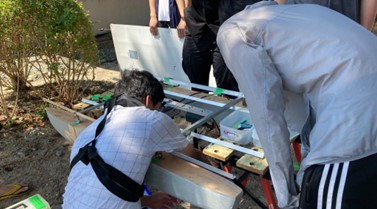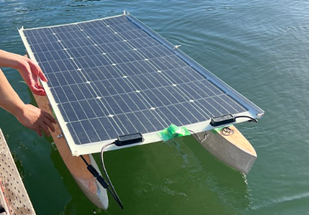⛵ 3月のコラム
⛵⛵ 海洋技術環境学専攻
⛵⛵⛵ 修士課程1年 内田真実さん





The “Lake Biwa Crewless Solar Boat Competition,” was held until 2022, and restarted in 2023, as the “E/SASV Games,” including the qualifying rounds in a virtual space. Our team has been working hard on the project.
This was reflected in our new boat, which adopted a catamaran as the hull design, only a few did something similar in the past 20 years of competitions. Because of its novelty, the hull and propulsion system required new attempts, and it was a repeated process of trial and error. As for the navigation system that supports the autonomous navigation of the solar-powered boat, we created a new navigation box to improve the robustness and ease of use of the system, and at the same time, we worked hard to improve the manuals so that they could be passed on to the next generation, an area that had been inadequate in previous projects. We are aware that there was no navigation that was trouble-free, whether it was the tank test the test conducted on Lake Sagami, the test conducted on Lake Biwa on the day of the competition, or during the competition. However, even in those situations, team members always had the attitude of “trying to improve as much under the time limit”. During the competition, there were times when we had to “devise ways to use what we had available”. These attitudes are very important and were trained through this project.
Finally, I would like to conclude by thanking the E/SASV Games Executive Committee, the teachers, the technical staff of the test tank, and Sagami Lake Katsuse Kanko for giving us this opportunity.


